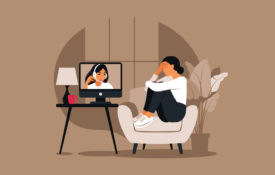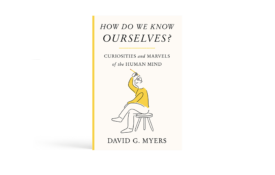-

Zoom and Alcohol Don’t Mix—Looking at Yourself During Online Social Gatherings May Worsen Mood; Alcohol May Increase This Effect
The more a person stares at themselves while talking with a partner in an online chat, the more their mood degrades over the course of the conversation, a new study finds. Alcohol use appears to worsen this effect.
-

Failure and Flourishing. Part 3 of 3 With David Myers
In the final discussion with social psychologist David Myers, APS’s Ludmila Nunes talks with him about the third section of his book, in which he applies his psychological insights to the larger world around us.
-
Why Do Our Brains Believe Lies?
It’s been an election cycle packed with misinformation and conspiracy theories. So why do so many people believe the lies? Blame the brain. Many of the decisions we make as individuals and as a society depend on accurate information; however, our psychological biases and predispositions make us vulnerable to falsehoods. As a result, misinformation is more likely to be believed, remembered and later recalled — even after we learn that it was false. “On every level, I think that misinformation has the upper hand,” said Nathan Walter, a professor of communication studies at Northwestern University who studies the correction of misinformation. ...
-
How Customer Psychological Mindsets Impact Their Financial Decisions
The aim of this article is to provoke some thoughts and considerations of how you, as leaders in financial services, might augment your communications to engage both systems of your audience’s brains—the smaller conscious, practical part and the larger nonconscious, emotional part. The financial industry worldwide is, firstly, governed, framed and communicated in numbers. So, it is unsurprising that organisations in this space engage with clients in terms of numbers around risks, gains, yields, outcomes and so on. This makes perfect sense if we take it at face value from an industry perspective.
-
How Simple Rituals Help You Overcome Nervousness and Anxiety to Perform at Your Best, Backed by Considerable Science
It's easy to assume tennis star Rafael Nadal has at least a little OCD going on. He always makes sure his chair sits perfectly perpendicular to the court. He always puts two drink bottles in front of the chair to his left, one behind the other, aimed diagonally at the court. Before he serves, he uses his right hand to touch the back and front of his shorts, then his left shoulder, then his right, then his nose, left ear, nose, right ear, and lastly his right thigh. At changeovers, he always waits for the other player to cross the line, then he crosses with his right-foot first. He folds a towel and puts it behind him, then folds a second towel and puts it on his lap.
-

What Defines Young Leaders? More Research Could Benefit Youth and Society Broadly
Lead author Jennifer Tackett: “The rapid development of personality, peer relationships, values and vocational identity during this period, make adolescence an optimal time for developing leadership potential.”

